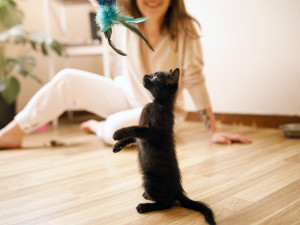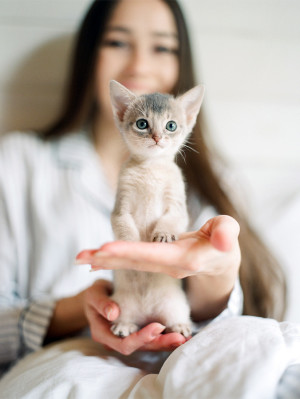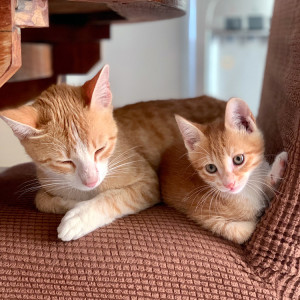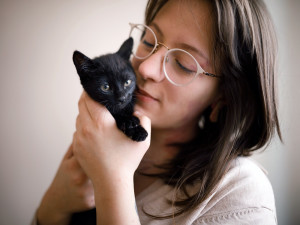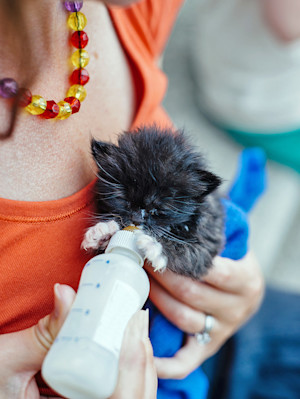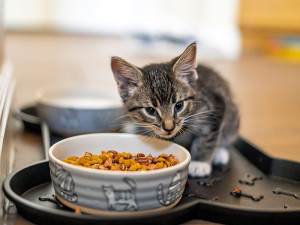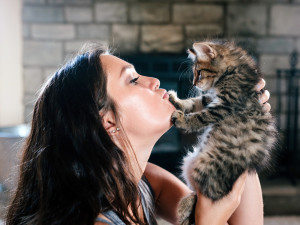What Can I Feed a Kitten?
Learn what nutrients are a must for your new little one.

Share Article
In This Article:
What Nutrients Do Kittens Need? Feeding Newborn Kittens Best Kitten Food Option What Can I Feed a Kitten Besides Cat Food?
Providing your kitten with a nutritionally balanced diet is crucial for their growth, development, and overall health. When deciding what to feed your kitten, you must understand their unique nutritional needs and choose high-quality, age-appropriate food to support their growing bodies.
What nutrients do kittens need?
Kittens can be rambunctious, snuggly balls of fun. Their bodies need proper nutrition to keep up with the demands of play and growth. For the first year or so, kittens require age-specific food. Diets made for kittens are more nutrient dense and are formulated to support rapid development and growth. The nutrients that kittens need include:
Protein
Cats are obligate carnivores, meaning they need protein from animal sources to be healthy.

Kittens require high-protein diets from a young age and require more protein than adult cats. Essential amino acids (those that must be consumed) such as arginine, taurine, and methionine, are vital for kitten growth and development.
Calcium and phosphorus
Kittens grow super fast and need additional calcium and phosphorus to support rapid bone growth.
Fat
Kittens need to consume more fat and essential fatty acids than adult cats. Fats aid in the absorption of certain vitamins. Fatty acids, like docosahexaenoic acid (DHA) and arachidonic acid (AA), are important for kittens’ brains, vision, and intestinal development.
Vitamins and minerals
Kittens require adequate amounts of vitamins and minerals, and they can be more sensitive than adult cats to diets that are deficient or overabundant in certain vitamins and minerals.
Water
Water is often considered the most vital nutrient. Relative to their body weight, kittens require much more water than adult cats. Kittens need plenty of water for normal bodily functions and to replace water lost through peeing, pooping, and evaporation.
Feeding newborn kittens
During the first two days of life, nursing from mom should be a nutritional priority. This is when kittens are able to consume colostrum — milk that is rich in antibodies and helps to build a newborn kitten’s immune system. Kittens should nurse from their mom for the first four to six weeks of life. Weaning should start at around four weeks.
In cases of orphaned kittens, the next best option is to find a surrogate cat who is willing to let an extra kitten nurse. If nursing is not an option, kittens should be bottle-fed milk-replacement formula made specifically for kittens. They shouldn’t be fed cow’s or goat’s milk.
Milks from other species don’t contain all the nutrients that kittens need and can cause stomach upset and diarrhea. If you’re bottle-feeding an orphan kitten, seek veterinary guidance to ensure the kitten is getting adequate nutrition and care.
Best kitten food options
Kitten parents face a plethora of decisions, from choosing a vet to where to put the litter box to what food to feed. Early nutrition is vital for kittens to get a good start in life. Without proper nutrition, kittens can face stunted growth, poor development, and immune deficiencies.
With the myriad of options available, it can be easy to fall into a trap of analysis paralysis. After all, you want the best for your kitten. But picking kitten food doesn’t have to be a complex (or final) decision. There is no single best food for every cat, but there are some guidelines to follow. Assuming there are no specific health concerns, when choosing kitten food, opt for one that:
Meets the life stage requirement: meaning it is formulated for growing kittens.
Has a nutritional adequacy statement: meaning it meets the standard set by the Association of American Feed Control Officials (AAFCO). An example statement can look like this: “Animal feeding tests using AAFCO procedures substantiate that (Kitten Food X) provides complete-and-balanced nutrition for (insert appropriate life stage; in this case, growth and reproduction).”
Your kitten tolerates it: meaning they want to eat it and make healthy, formed poops after eating it.
Fits your budget and lifestyle: meaning there is leeway to do what works for you and your cat. You don’t have to buy the most expensive food. Get the highest-quality food you can afford.
Best wet kitten food options
Wet food has the benefit of being the easiest transition from milk or kitten formula to solid food. Additional benefits of wet food for kittens include:
High water content: Kittens may not be big on drinking water, so feeding canned food is an easy way to keep them well-hydrated.
More enticing: The strong aroma of wet food can be more enticing to kittens.
Easy to chew: The soft texture is easier to chew and helps to ease the transition to solid food.
More protein: Canned kitten foods tend to have more protein than dry kibble, making it easier to provide some essential nutrients for growth.
Best dry kitten food options
Dry kitten food is convenient and easier to keep fresh after opening. Additional benefits of dry food for kittens include:
Small kibble size: Kitten kibble is sized and shaped to be easy for kittens to chew and swallow.
Dental health: Chewing on dry kibble helps reduce plaque and tartar buildup, promoting dental health.
Convenient for free feeding: Dry kibble can be left out, allowing kittens to graze and eat at their own pace.
Cost: In general, dry kibble tends to be more cost-effective than canned kitten food.
Overall, exposing kittens to a variety of scents and textures early in life can help combat picky eating habits in adulthood. Most cats will develop a preference over time, though.
Kitten prescription diets for health issues
Many feline prescription diets are made for adult cats with chronic health issues, though occasionally, kittens can also benefit from prescription diets.
Diets formulated for “recovery” or “urgent care” are nutrient dense and highly digestible. They can be prescribed for kittens recovering from illness or surgery, or kittens that are just off to a rough start.
Prescription diets formulated for intestinal health are highly digestible and easy on the GI tract. These may be prescribed for kittens recovering from severe vomiting and diarrhea or intestinal surgery. Kitten parents should only feed a prescription diet if it is recommended by their vet.
What can I feed a kitten besides cat food?
The advantage of quality commercial kitten diets is that they are “complete and balanced,” meaning they provide all the necessary nutrients without needing additional supplements. Unless your kitten has very specific medical needs requiring a veterinarian-guided homemade diet, a commercial diet is recommended.
Human foods safe for kittens
Exposing kittens to new foods and textures can be fun and enriching. Only offer tiny, bite-sized portions and give human food sparingly. Human foods and treats should not make up more than ten percent of a pet’s diet, and too many new foods can cause diarrhea. Some human food your kitten can taste include:
Cooked chicken (no salt, seasoning, or bones)
Cooked ground chicken or turkey (no salt or seasoning)
Cooked white rice
Cooked peas
Cooked eggs (no shell)
Canned pumpkin (the real deal, not pumpkin pie filler)
Canned tuna (in water, not oil)
Homemade kitten food
In an emergency, a kitten can eat a single meal of mostly protein (chicken, ground beef or turkey) with some cooked egg and cooked white rice. But this option is not nutritionally complete for a kitten and an abrupt change in diet can cause stomach upset.
Pet parents who want to prepare homemade meals for their kitten should consult with a board certified veterinary nutritionist to ensure all of their kittens’ nutritional needs are continually met as their kitten grows. A veterinary nutritionist can be found via:
Referral from your primary veterinarian
Veterinary colleges
American College of Veterinary Internal Medicine (ACVIM) online directory
FAQs (People also ask):
When can a kitten eat wet food?
A kitten can start to eat wet food around four weeks of age. Kitten parents can slowly introduce wet food by adding one to two tablespoons of canned kitten food mixed with water or kitten-replacement formula to create an easy-to-eat gruel.
Can a kitten eat dry food?
Kittens can eat dry food once all their baby teeth are in, at about six weeks of age. To introduce dry food, soften the kibble with warm water for the first week or so. Add less water over time to allow your kitten to get used to the crunchy texture.
What can I feed a baby kitten?
Newborn kittens should nurse from their mom for the first four to six weeks of life and start weaning at four weeks old. Orphaned kittens can nurse from a willing surrogate cat or be fed commercial kitten-replacement formula (not cow or goat milk).
References:

Dr. Alycia Washington, DVM, MS
Alycia Washington is a small-animal emergency veterinarian with over 10 years of experience based in North Carolina. She works as a relief veterinarianopens in new tab and provides services to numerous emergency and specialty hospitals. She also works as a veterinary writer with a focus on educating pet parents.
Related articles
![Relaxed girl holding a black kitten near her face.]()
What to Expect When Fostering a Kitten
Besides plenty of cuteness, of course.
![Woman bottle feeding kitten.]()
How to Bottle-Feed a Kitten
Starting with the supplies you’ll need.
![Kitten eating dry food from a bowl.]()
Can a Kitten Eat Dry Food?
And the nutrients you should make sure they’re getting.
When Can a Kitten Leave Their Mom?
And why it’s important for their health to stay with her as long as possible.
![Woman feeding her kitten.]()
When Can a Kitten Eat Wet Food?
And how to know what kind they need.
![Ginger cat mom and kitten resting.]()
Kittens Really Need Their Moms—Science Says So
The “I’m just a baby” TikTok sound definitely applies here.
![Woman holding brown kitten to her face.]()
8 Myths About Your Kitten—Busted By a Behaviorist
Forget everything you think you know about baby cats.
![Woman playing with a black kitten.]()
5 Kitten Behavioral Milestones You Should Know
Keep track of all their fun phases with these guidelines.

